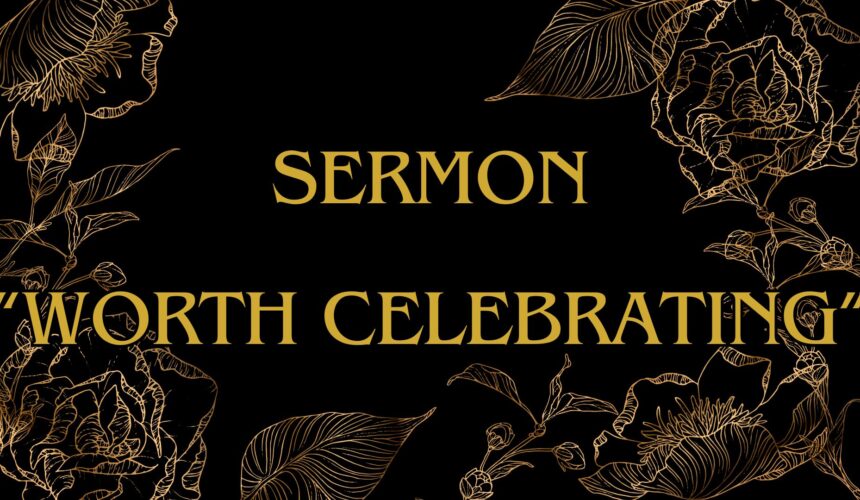Fifth Sunday of Easter/Celebration Sunday
May 18, 2025
Psalm 100
You think you’ve got problems.
Imagine living in ancient Israel when the Psalm we just heard was written.
If you lived at that place and time (let’s say about 1000 – 800 BCE), At birth, your average life expectancy is probably about 35 years – but that’s only because the infant mortality rate is higher than 30%. If you make it into adulthood, you could survive for as long as 70 years.
And what a life you’ll have.
You’ll live in a one room mud brick house with a small walled off courtyard. Your whole family will sleep in that one room. You might have one cow, if you’re doing well, or a few sheep in the yard outside your door – that is, if they’re not sleeping in your one room with you, which sometimes happens.
Don’t even ask where the bathroom is.
Water’s not especially convenient; maybe there’s a village well or some other common place people go to draw water.
And soap? It’s one of the best disease prevention tools ever invented – but it hasn’t been invented yet.
On especially hot nights during the summers, you might go sleep on the flat dirt roof of your one room house. If the roof is in good shape it won’t leak when it rains, but sometimes water does leak onto the dirt floor where you’ve got your sleeping mat, which then becomes a mud floor.
Of course, if you’re rich, you might have a stone floor and an extra room; maybe even two. Otherwise, the house is pretty much the same as everybody else’s.
Your food is simple, at least when you can get it: a few different kinds of grains, maybe some fish if you live close to water, a few vegetables you grow yourself or buy with the pennies you can earn. If you’ve got a weight problem, your problem is that you don’t weigh enough because there’s usually not enough food. And every five years or so there’s a crop failure, maybe even a famine. This of course contributes to the infant mortality rate, and it’s not so great for adults either.
But even in good years, when there’s plenty of food, it’s hard and probably painful to eat because a lot of your teeth are bad or just gone. And it’s difficult to enjoy your food even if you can chew it because sanitation is not very good, so you’ve probably got some kind of parasitic infection, or maybe several of them.
By the age of 50, maybe even earlier, arthritis has set in so it hurts to move.
You live in a small village of people who all share roughly the same circumstances. A decent sized town is maybe 400 people, and you’ll spend pretty much your whole life there – unless commanders of the army come to take young men from your village to go fight in a war against a neighboring Kingdom, which you know very little about. But it’s not like you have a choice: this is not an all-volunteer military. War and political intrigue are constant realities; the Kingdom where you live is surrounded by other Kingdoms, ruled by people who hate you and want your territory. So you live in constant awareness that another war or border conflict may start any day, and it could come to your doorstep.
Now maybe hearing that glowing description you don’t want to live in the Ancient Near East around the time Psalm 100 was written. So OK – how about we jump forward in time about a thousand years to the year 30: when Jesus was alive and the Psalm we heard this morning would have been used in worship in the Jerusalem temple. How about that?
Well, sorry, but…
things are about the same.
Except now, the Holy Land has been entirely overrun and conquered by the Roman Empire, and you live under a brutal Roman military occupation. Taxes are astronomically high. If you’re a landowner, you can always take out loans from wealthy people to pay your taxes because you don’t make enough off your small farm to cover the bill. But then if there’s a bad year and you can’t pay your loan back, you lose your land because that was your collateral for the loan. So now you have to hope you can make a living as a carpenter or a stone cutter or some kind of laborer, working for wealthy people in nearby towns. And you’re now one step closer to being a homeless beggar.
If you were a fisherman, you had to give up a large percentage of your catch to Rome or to local authorities. You only got to keep a little of it to sell or eat. So that’s a hard way to make a living too.
At least now you’re not so much under threat from neighboring Kingdoms, because the Roman empire is so vast and powerful. The Romans won’t force you to fight in the army, so that’s good. But Jewish nationalist fanatics roam the hills and the local countryside trying to stage an armed rebellion against Rome. Revolutions are expensive, so those nationalist fanatics need money to finance their revolt. Even if you’re just a passing traveler going from one place to another, they’ll probably attack you and rob you to get it. Which means travel’s not safe either.
I could go on, but you get the point. Whether you live in the ancient near east of 1000 BCE or the year one, things are not good. Personally, if I get to choose I’ll take the 21st century United States any day of the week.
But of course, we don’t get to choose. We live in the time and the world we do, just as our ancient ancestors did, and we meet the challenges of our time with whatever resources we have. But I wonder: how does a time and a culture like that of the Ancient Near East, where people lived in harsh conditions under constant threat of violence and brutality and disease and starvation and early death, how does that culture write poetry like Psalm 100, about joy and glorifying God? How does it write any of the Psalms of joy and praise? And why does our time and our culture write so few?
Now I know there are plenty of Psalms that are not joyful. There are Psalms of Lament, Psalms that express anger at injustice, Psalms that are impatient with God, even Psalms that wish pain on one’s enemies. And believe me, I know times are troubled right now in the 21st century for us. We’re dealing with threats that ancient Israel could not have imagined. But even in their often miserable lives, somehow our ancient ancestors in the faith found joy and hope; they found resilience and beauty. And I think the ancient poetry they left us in Psalms can help us find those things too.
I think the people of Ancient Israel built two pillars of spiritual life into their songs of worship, this book that we call Psalms. First, they saw clearly that there is no moment, no situation, no place at which God is not present, no matter what else may be happening. Psalm 139 says, “where can I go from your spirit? Where can I flee from your presence? If I ascend to heaven, you are there. If I make my bed in Sheol, you are there. If I take the wings of the morning and settle at the farthest limits of the sea, even there your hand shall lead me and your right hand hold me fast.” The ancient Israelites recognized that while the temple or the tent of meeting or the ark of the covenant were all holy, there was nowhere they could be where God was not already and eternally present.
I think they realized too that hope and joy and celebration are not responses to good circumstances so much as they are spiritual disciplines, practices that allow God to cultivate attitudes and habits of heart in us that free us from the tyranny of circumstance and make us more resilient and aware of God’s presence in every moment.
So we all know it’s true: the world’s not exactly going to heaven in a handcart right now. But if it’s true that God is always present to us, and if it’s true that joy and praise and glory and resilience are all practices whose reward is an attitude of joy and praise and glory and resilience – maybe that’s all the more reason to celebrate, even to have a celebration Sunday. Maybe that’s all the more reason to have a day like today, here in our church – to take joy in our community and know that our joy and our praise and thanksgiving and celebration all point to God and praise God, whatever else may be going on.


